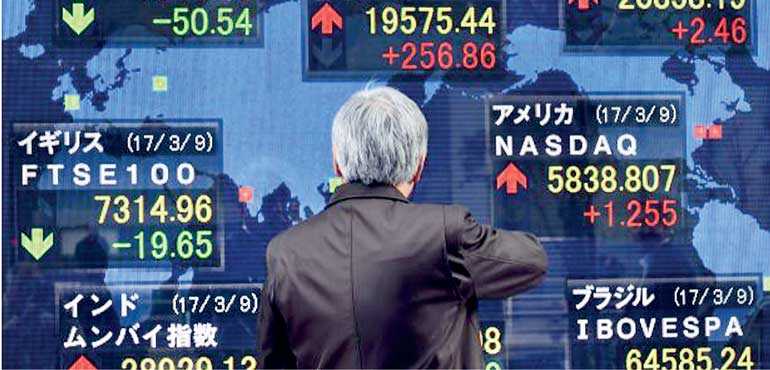Monday Feb 23, 2026
Monday Feb 23, 2026
Friday, 1 June 2018 00:00 - - {{hitsCtrl.values.hits}}
 TOKYO (Reuters): Asian stocks rebounded from a two-month trough on Thursday and the euro enjoyed a respite after sinking to its lowest in 10 months as the political turmoil in Italy that roiled global financial markets showed signs of easing.
TOKYO (Reuters): Asian stocks rebounded from a two-month trough on Thursday and the euro enjoyed a respite after sinking to its lowest in 10 months as the political turmoil in Italy that roiled global financial markets showed signs of easing.
Spreadbetters expected European stocks to open slightly higher, with Britain’s FTSE edging up 0.05%, Germany’s DAX adding 0.1% and France’s CAC .FCHI rising 0.05%.
Hong Kong’s Hang Seng rose 0.75% and the Shanghai Composite Index gained 1.4% after news that growth in China’s vast manufacturing sector accelerated strongly and well above forecasts in May to an eight-month high.
MSCI’s broadest index of Asia-Pacific shares outside Japan gained 0.6% after slumping on Wednesday to its weakest since early April.
South Korea’s KOSPI added 0.5% and Japan’s Nikkei advanced 0.8%.
Overnight, the Dow rose 1.25% and the S&P 500 climbed 1.27%.
Global stocks were battered, safe-haven government prices rose sharply, and the euro tumbled earlier in the week after Italy’s two anti-establishment parties scrapped plans to form a coalition.
That raised the prospect of a new general election, stoking fears such a vote would effectively be a referendum on Italy’s euro membership.
A degree of calm, however, returned with the two anti-establishment parties renewing efforts to form a coalition government rather than force Italy into holding elections for the second time this year.
“Experience shows that these ‘crises’ tend to settle down for long periods once the initial adjustment of market expectations has been effected,” Carl Weinberg, chief international economist at High Frequency Economics, wrote in a note to clients.
A successful auction of five- and 10-year government bonds also assuaged concerns about Italy’s ability to finance itself after the turbulence in its debt market sparked the biggest one-day spike in two-year bond yields in 26 years. Bond yields rise as prices fall. “The financial markets have been able to assess and digest the situation in Italy over the past few days and it is now time for a bit of a reprieve from the turbulence,” said Masahiro Ichikawa, senior strategist at Sumitomo Mitsui Asset Management in Tokyo. “The reprieve will allow the markets to return their focus back on fundamentals, such as Friday’s U.S. non-farm jobs report.” The euro stood little changed at $1.1664 after rallying 1% the previous day. The currency had sunk to $1.1510 on Tuesday, its lowest since late July 2017. The dollar index against a basket of six major currencies dipped 0.1% to 94.055 after surging to a near seven-month peak of 95.025 on Tuesday.
The US currency traded at 108.780 yen, off a low of 108.115 brushed on Tuesday when risk aversion in the broader markets increased investor demand for yen, which is often sought in times of market unrest.
The dollar received some support as signs of an easing in Italy’s political crisis pulled US Treasury yields up from multi-week lows.
The 10-year Treasury note yield stood at 2.849% after declining on Tuesday to 2.759%, its lowest since 11 April. Crude oil prices eased after rallying overnight.
US crude futures fell 0.18% to $68.09 a barrel after gaining 2.2% on Wednesday when Russia’s central bank expressed caution on plans to boost oil supply. Prices fell to a six-week low of $65.80 a barrel on Tuesday amid concerns that Saudi Arabia and Russia might increase their output.
Brent crude lost 0.35% to $77.23 a barrel after jumping 2.8% on Wednesday.